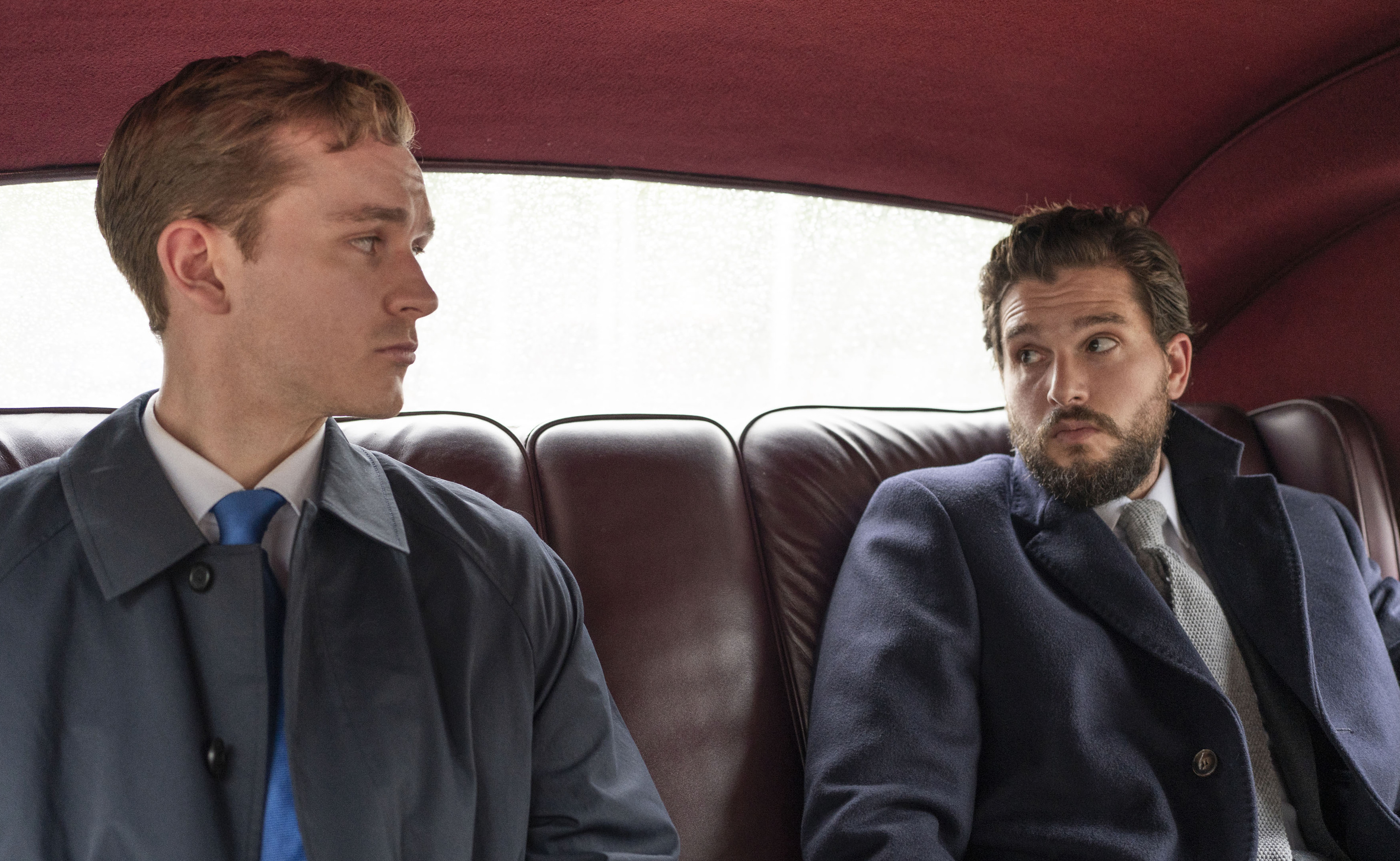All three seasons of Industry are now on iPlayer, and after watching the most recent one and then backtracking for another look at the other two, I am still in two minds about it. With its forensic display of a toxic world where people are viewed as “capital” and anomie is the prevailing mode, is it masterly drama or an overheated mess?
The pat answer would be, it’s both. Those two options become intertwined and indistinguishable the more you watch. Stylistically, it has a winning hand in its presentation of bouts of drink and drug-fuelled sex, wounding betrayals, vicious workplace behaviour, all served up with a matter-of-factness that is initially disorienting. Who am I supposed to admire, to hate, to suspect? You are in awe of it, even as you want to avert your eyes. (We in the UK were spared the erect penis that starred in episode one of season three, illegal on our screens, though, oddly, not in the US.)
On the other hand, this relentless combat is more or less all the series has to trade with. After a while you yearn for a display of genuine kindness or a sympathetic gesture that isn’t rewarded with spitefulness. Even a glimpse of the graduates as they were when they first arrived at Pierpoint investment bank, before they became conniving nightmares, would be good. But there is no let-up in the cruelties of this hothouse of a workplace. Only the soundtrack is cheery: bubbly incidental music by Nathan Micay that sounds like it’s coming from a chic rave venue somewhere in the distance, alongside astutely-used pop tracks whose lyrics underline the themes of the scene.
 The enormous cast includes many a name actor in a walk-on part, but its trump card is the squad of outstanding newbies it has since made famous, playing the rising stars at fictional bank Pierpoint: Myha’la as Harper, the American fraudster, bright, ballsy and unscrupulous, who has her reflex smile wiped away as she plays corporate snakes and ladders; Harry Lawtey as Robert, the clever but gauche working-class outsider, whose narcissism turns out to be as pronounced as everybody else’s; and Marisa Abela as polyglot Yasmin (pictured right), the wealthy spoilt-brat daughter of a financial buccaneer, who sheds plentiful tears, most of them for herself.
The enormous cast includes many a name actor in a walk-on part, but its trump card is the squad of outstanding newbies it has since made famous, playing the rising stars at fictional bank Pierpoint: Myha’la as Harper, the American fraudster, bright, ballsy and unscrupulous, who has her reflex smile wiped away as she plays corporate snakes and ladders; Harry Lawtey as Robert, the clever but gauche working-class outsider, whose narcissism turns out to be as pronounced as everybody else’s; and Marisa Abela as polyglot Yasmin (pictured right), the wealthy spoilt-brat daughter of a financial buccaneer, who sheds plentiful tears, most of them for herself.
Watching season one again, you realise how carefully the scripting has nurtured its forces, foregrounding characters who will recede then come full circle in season three, giving the leads catalysts for their worsening moral and mental health. The ring-master of this semi-feral circus, baseball-bat-wielding Eric Tao (Ken Leung, pictured below left), a veteran trader whose seams are starting to split, is slowly drained of his pizzazz, divorce and office politics having turned his face haunted and his dialogue bitter. The juniors seem to be secretly looking for a father-figure, but he’s not it.
In this amoral universe, viewers may eventually lose their bearings too, becoming inured to the knee tremblers in the loo, the unlikeliness of the couplings, the sudden reversals of fortune, the shocking betrayals. And all conducted in a subset of the King’s English peppered with acronyms and buzzwords that are never explained to ordinary mortals. Most will grasp at shreds of dialogue for enlightenment and, like a small child with squabbling parents, judge the seriousness of what’s going on by the tone of the exchanges, not by what’s actually said. This makes the tense scenes where big trades and whole companies are in jeopardy frustratingly hard to read.
 Besides, the programme-makers have decided to make things even trickier by engaging in “authentic” sound recording that obscures at least a third of the dialogue. Sound levels suddenly plummet, characters have to compete with other speakers, key words are swallowed. It lends authenticity, but it’s irritating, You also have to agree to be swept along by the relentless pacing as the main characters go through private hells, fall into taxis out of their heads after sessions at pub and club, then sit silently at their banks of computer screens the next day to do it all again.
Besides, the programme-makers have decided to make things even trickier by engaging in “authentic” sound recording that obscures at least a third of the dialogue. Sound levels suddenly plummet, characters have to compete with other speakers, key words are swallowed. It lends authenticity, but it’s irritating, You also have to agree to be swept along by the relentless pacing as the main characters go through private hells, fall into taxis out of their heads after sessions at pub and club, then sit silently at their banks of computer screens the next day to do it all again.
And yet… there is something horribly compelling about this menagerie. You care about their fates inasmuch as you want to see whether they are found out or fail catastrophically, as Rishi does in a memorable season three episode. Is the corporate world really this dire? You slog on in their company, in the hope of finding a silver lining for them.
It’s not just the lurid sex that appeals. The rampant rumpy-pumpy gets boring on-screen, though there are new permutations and positions in each episode, with plenty left unexplored when season four, just commissioned, comes to be written. (Micturition featured in season three, as did lipstick lesbianism, but still left to play with are coprophilia, troilism, S&M, cos-play, infantilism, bestialism…) But the sex is a vital element, another currency for these predatory characters to trade in. When Kit Harington (pictured above right, with Harry Lawtey) pops up in a stellar turn in season three as a conflicted philanthropist and entrepreneur, Sir Henry Muck, suddenly things fall into place: Industry is Game of Thrones for the Succession audience (it shares a producer, Jane Tranter, with Succession). It’s a saga of warring citadels – GS, MS, UBS et al – that make temporary alliances, even with former enemies, to gain territorial advantage and, here, humungous wealth, but with treachery always in the wings. The GoT “Red Wedding” episode was a gorier version of the scene in season two where Eric, Harper and Rishi go to sell themselves to the genial MD of a rival bank, Eric’s friend…
When Kit Harington (pictured above right, with Harry Lawtey) pops up in a stellar turn in season three as a conflicted philanthropist and entrepreneur, Sir Henry Muck, suddenly things fall into place: Industry is Game of Thrones for the Succession audience (it shares a producer, Jane Tranter, with Succession). It’s a saga of warring citadels – GS, MS, UBS et al – that make temporary alliances, even with former enemies, to gain territorial advantage and, here, humungous wealth, but with treachery always in the wings. The GoT “Red Wedding” episode was a gorier version of the scene in season two where Eric, Harper and Rishi go to sell themselves to the genial MD of a rival bank, Eric’s friend…
The hollow men of global finance are seriously exposed in Industry. Their profession, some of them have spotted, is not that different from a bloodsport, or high-stakes gambling, but refocused by them as an admirable martial art. Women are no better in this arena: to succeed, they understand they must appear to toughen up and be as treacherous as the men, including in their dealings with each other. Yas, in particular, has learned her Pierpoint lessons well. Perky and weirdly naive but not without guile in season one, she has been built up by the writers layer by layer, so that by the end of season three she has become a form of Lady Macbeth, trying to ride out the taint of her traumatic past. And Harper has become the supreme cat with the cream, as her smartness dictates she should be, playing with the big boys again after her ejection from Pierpoint.
I’d end it there: the arc of the show seems to have reached a climax now, with the force of something by Euripides or Wagner, and to go on for another season seems like hubris. But then again, the chance to find out whether life is going to give these characters a corrective cold shower is irresistible. The world they inhabit is a moral mess, and the show is not quite a flawless masterpiece, but it is bold, addictive television. Now press “Buy”.















Add comment